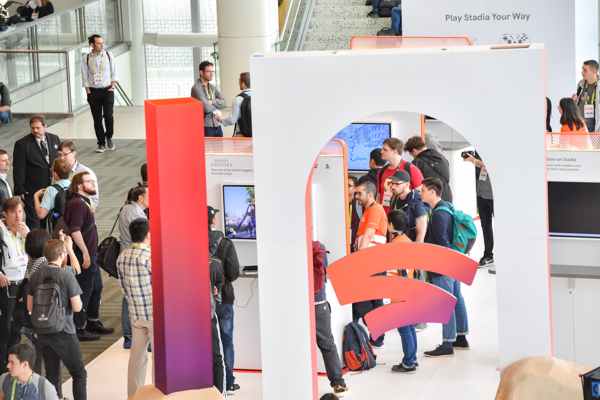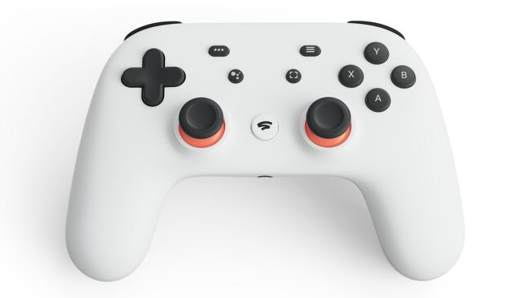| Stadia - Google's Cloud Gaming Streaming Platform |
| Written by Lucy Black | |||
| Wednesday, 20 March 2019 | |||
|
Google's Stadia, its subscription-based cloud gaming service, was formally announced during Google's keynote at the 2019 Game Developers Conference. Stadia will deliver access to games on any screen - TV, PC, laptop, tablet and phone - via the Chrome browser and requires no additional hardware, although Google has developed its own controller.
Google Stadia's demonstration area at GDC Stadia is the follow-on from Project Stream which last September was Google's first official foray into gaming. As its name suggested, Google's choice of delivery was online streaming. According to Google VP Phil Harrison, the new name "Stadia", the plural of "stadium" is meant to suggest a place rather than a device. Harrison told Digital Foundry's Richard Leadbetter: the point of our platform is that we are not a console. It's a place to gather, it's not about marketing a device or being device-centric in our thinking. We're not making a box, we're making a place. It's a place where you can have different types of game experiences, whether you are watching, playing, participating, whether you're being entertained or whether you are the one doing the entertaining. All that being joined together into one idea, very inclusive, hopefully over time expanding to include the broadest set of gamers that we can possibly imagine today, scaling into the future and supporting every type of game, from input modalities to fundamental game types and styles, that you can experience. Explaining that the platform engages deeply with YouTube technology Harrison also referred to two distinct groups that Stadia is intended to cater for: There are people who play games and there are people who watch games. There are 200m people watching games on YouTube every day. In 2018 there was 50bn hours of watch time of game content and you know, just unpack that mentally for a second in terms of what that means in years. It's insane in terms of time and population, and our vision for our platform is to converge those two worlds together so that you can be watching a game, click and be playing a game and vice-versa. He also stated that Google's goal is to make those games available in resolutions up to 4K and 60 frames per second with HDR and surround sound. Referring to the fact that Stadia will work on any screen he stated:, A fundamental part of our platform is that we're screen agnostic. And the thinking there is that historically, up until this point - really for the last 40 years - all game development has been device-centric. As a developer I'm building to the constraints and scaling my creativity down to fit within the box I'm writing to. We want to invert that model with Stadia; we want developers to scale up their ideas and be unbound by the constraints of any single device. As a cloud service users will just click on a link and the game starts in less than five seconds: no download, no patch, no install, no updates and in many cases, no hardware required. The suggestion is that an old laptop running the Chrome browser will do. While any USB controllers that supports the HID standard should work, but Google is building on of its own that has some extras. One special feature is its "capture" button, which allows players to easily record gameplay and upload it to YouTube. The second button is, predictably enough given this is Google, for finding information, including how to get further in a game. Instead of having to interrupt play to open a new browser window, do a search, and be guided by walkthroughs, users can simply hit the Google Assistant button on the Stadia controller and ask for help to them get past the section they're in. All this sounds well and good but the obvious problem is latency. Harrison is very upbeat about this too. Talking to Leadbetter who raised this issue he replied: There are some investments in the datacentre that will create a much higher experience for more people, and there are some fundamental advances in compression algorithms. Google is a participant and forerunner in a lot of open standards in compression algorithms that will power the future of streaming... one important thing to keep in mind is that we are building our infrastructure at the edge. It's not just in our central, massive datacentres. We're building infrastructure as close to the end user, the gamer, as possible - so that helps mitigate some of the historical challenges, and using a much more straightforward and less sophisticated version of our streamer on Project Stream landed an incredible result. Harrison's case rests on the idea that clients will always be inside the Google private network and connect by the proprietary backend, that has 450,000km of fibre connecting datacentres around the world. citing latency statistics: San Francisco to New York is sub 20ms, Frankfurt to Madrid is like another sub 20ms. Even Google has discovered that the last part of the connection is the hardest and slowest, forcing it to discontinue Google Fibre that could have got it closer to many users and this may prove a limiting factor for Stadia's success. The plan is to launch later this year in select countries - the US, Canda, UK and much of Europe, i.e. the best bet as far as connectivity and latency are concerned. During the GDC 2019 keynote Google also announced Stadia Games and Entertainment, a new first-party games studio that will be creating exclusive games for the new platform. Jade Raymond, a longtime producer and executive at both EA and Ubisoft has been recruited by Google to head this and no doubt there will be fierce competition to be part of it.
More InformationRelated ArticlesBrendan Eich Has Seen The Future - Video Streaming Using Just JavaScript Watch Soccer Games In 3D On Your Table Top To be informed about new articles on I Programmer, sign up for our weekly newsletter, subscribe to the RSS feed and follow us on Twitter, Facebook or Linkedin.
Comments
or email your comment to: comments@i-programmer.info |
|||
| Last Updated ( Wednesday, 20 March 2019 ) |





